

Fri 09 / 04 / 21
The return of Brighton Fringe: the impact of the pandemic on culture in Brighton
Brighton Fringe Festival is back for 2021! Find out from Robert Batson, who works on the development of the festival, what impact the pandemic has had on culture in Brighton - and what the Fringe will look like this year.
By Hannah Jackson of Brighton Chamber
Hi Robert, would you like to introduce yourself and tell us a little about what you do, and your role in organising the Brighton Fringe Festival?
Hello! I work on the development side of Brighton Fringe, which is just securing support for the festival to return year on year. A lot of my time is spent writing grant applications, building partnerships with local and national businesses, and keeping our donors and Friends of Brighton Fringe close to the festival.
It’s been a difficult year for the arts sector. What impact has the pandemic had on culture in Brighton?
Brighton remains a city of brilliant culture, but the infrastructure to support it has taken a severe hit. Not only are many venues at immediate risk of closure, but we’ve already lost creative spaces central to grassroots artists (RIP Marwood, too pure for this world).
Some actual-real-positive-news-everyone-forgets: Brighton is still full of artists, they’re stuck indoors like the rest of us. Cinebra, Herbie Flowers, and Alfie Ordinary are still in the BN postcode and they are still the wonderful, inspiring performers they were before the pandemic.
How do you think this year’s Brighton Fringe Festival will contribute to the cultural recovery of Brighton?
We’re still dealing with the panic of last spring when all of cultural society came to a grinding halt. A lot of the larger artistic infrastructure and institutions survived because of established and diverse income models, which like good on them, that’s what the arts council is for. Independent artists, venues, and the communities suffered the most. They were the ones who lost the security of bookings, audiences, and income and the funding disparity between the grassroots and long standing arts organisations has never been clearer.
Since the discussion of “cultural recovery” is lead by institutions instead of individual artists, the onus is on us (festivals, cultural committees, local working groups, etc.) to ensure that the ones who bore the worst of the pandemic are taken care of. If we’re not ensuring that the venues, artists, and communities we depend on are supported, what was the point of the last twelve months? Why did we do all this planning?
We’re in a unique spot as the festival dates line up to the general easing of restrictions so some of the first, in-person, live performances happening this year will be at Brighton Fringe. What we want more than anything is to help recover the community, which is really as simple as getting people to turn up to shows. That’s what we’re here for.
What can local businesses do to support the Brighton Fringe, and what would a partnership look like?
Call me! One of festival’s biggest assets is our marketing reach, our identity and brand recognition, and our ability to engage communities and consumers! We’re incredibly flexible, able to accommodate every wonderful / risky idea brought up.
Are you a landscaper? Let’s build a picnic area for family performers!
Do you have a blossoming chocolate company? Sounds amazing, we’ll host a workshop or offer tastings at Fringe City!
IT firm specialising in disaster recovery solutions for large-sized companies? Cool! We’ll put a show package for you to court your accounts!
Brighton Fringe exists for the community, and that means deepening our relationships with every trader that makes Brighton’s economy so attractive to the rest of the country.
So, tell us a bit more about Brighton Fringe this year, what have you got in store for us? How will this festival be different from previous ones?
This question keeps me up at night.
What’s missing: the printed brochure, standing room only capacity, and the big banner on New Road that says “FRINGE” in purple letters (made it harder for the jugglers to get in and out).
What’s new: a digital programme on the relaunched app and website, a big purpose-built event space in front of St Peters, a colour printer in the office, and 40,000 litres of hand sanitiser.
And finally, one of our favourite questions from our weekly Member Meet-ups, with a twist. Can you tell us a fun or interesting fact about Brighton Fringe Festival?
I don’t know! Absolutely no idea. I moved to Brighton in January 2020 (a prophet of doom) so I’ve never worked for a full Brighton Fringe festival! Although when I came to the festival in 2019 as a punter, there were a lot of secret gigs going on; Fatboy Slim doing a hidden DJ set, Sophie Duker testing material at an open mic, rumours of Aunty Donna appearing like a bigfoot for an impromptu fifteen. Those are the shows you really want to hunt down, and I think this coming festival will have plenty of surprises like that. It’s Fringe after all.
Find out more about this year's Brighton Fringe Festival on their website. If you're interested in supporting the festival, check out their sponsor page here.

Robert started producing shows in pubs, churches, and dockyards at the Edinburgh Fringe before moving back to America. He worked for two of Pennsylvania’s most famous theatres; managing theatre companies and begging wealthy Philadelphians to fund the arts. He moved to Brighton last year and already has three tattoos and an oat milk habit to prove it.
If you want to contribute to the Chamber blog, contact us on hannah@brightonchamber.co.uk



